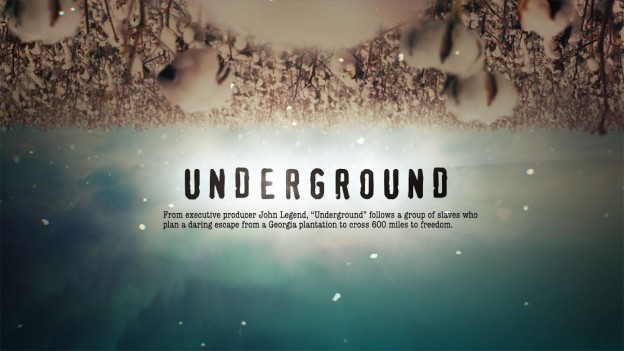Underground a new television series premiered on WGN America early in March that focuses on a group of slaves who dare to make a 600-mile escape from a Georgia plantation.
While there have been some on social media asking why we should continue to discuss the slave narrative in “post-racial” America, the actors and producers of “Underground” challenge us to answer why we shouldn’t.
WATCH: Underground Trailer
At the annual NABJ Convention in Milwaukee, Wisconsin in 2015, the cast and writers sat down and spoke with some of the journalists in attendance. There, actress Jurnee Smollett-Bell, who plays Rosalee, stated, “We can’t heal present day wounds, if we don’t go to the past for answer.”
It sounds a lot like the statement those who don’t learn history are doomed to repeat it. And I wonder, how important and true this statement really is for all of us. I mean, just reflect on your personal history, relationships, and situations.
Do you notice a pattern?
Whenever I reflect on my personal history, relationships, and situations, I have found that if I didn’t “learn” a lesson, then I usually repeated it.
Reflecting historically, I see a repetition of the similar “lessons”. Just to name a few: the Flint Water Crisis, The Detroit Public Schools situation, wars, police harassment, racial profiling, the economy… there are just a few examples of these situations getting repeated. Sadly, these are also similar to situations my mother and grandmother experienced when they were growing up.
So, how do we as Americans begin to fix this?
According to one of Smollett-Bell’s fellow cast members, “We need to hear this story right now [to] re-educated and re-calibrate our minds.”
By re-educating and re-calibrating our minds, we can then begin to learn those lessons from history and begin to fight to fix them. It isn’t just a “Black” thing, a “White” thing, a “Latino” thing, an “Asian” thing, or a “Native American” thing.
It’s an American thing. Each marginalized group has always had to deal with discrimination in some fashion.
One cast member stated, “We’ve always had to take our freedom and always had to say our lives matter.” And I agree. For each marginalized group, it’s completely true. Yet somehow, even after the Civil Rights Movements of the early and mid 1900s, we still have to say [marginalized groups] lives matter. Even after the election of President Barack Obama, many Black Americans still wonder if this is the “post-racial society” that it is claimed to be.
The murders of Trayvon Martin, Sean Bell, Tamir Rice, Michael Brown, Sandra Bland and Rasheeda McBride leave us wondering what has changed since the late Malice Green was murdered.
Some will even go as far as to claim Donald Trump’s seemingly successful bid for the Republican Party Presidential Nomination means his rhetoric is striking the hearts of those with similar ideologies. It concerns some because if they hold such views as it appears in the voting booth, what does that say about this “post-racial society”.
Alano Miller, who portrays Cato in Underground, has stated this TV series is “about our kids future; it’s a true and honest conversation.”
Instead of focusing on just the slave narrative Underground, Smollett-Bell tells those of the HuffPost Live in an interview that the TV series focuses on “overt and systemic racism”. She also states it focuses on other issues such as mass incarceration, the racial wealth gap, and mental health –which disproportionately impact black Americans.
WATCH: HuffPost Live Interview with Jurnee Smollett-Bell on Systemic Issues
As I’ve continued to learn more about the history of America, I’ve come to realize just how ingrained racism is into our society’s mentality. It is a sole reason for many of our systemic issues to date. And not surprising, as a young woman of color in an urban environment, I’ve experienced some of those same types of racism myself.
I’ve asked way too many times recently: When will I ever not have to police myself in my Black skin to prevent judgement from others? I felt this way acutely on the day Michigan held its primary election.
Many times that day, I asked: Where is someone who represents me in what I saw? Or when when will I be allowed to be who I am without someone questioning my abilities?
But like Underground screenwriter Misha Green, who joined some of the cast members at NABJ, stated “[Underground] is about the revolution… We didn’t have to make this stuff up.”
Because at the end of the day, this problem is part of the fabric of American culture. And if art holds a mirror up to society as Smollett-Bell told the Huffington Post, the question lingers: What will future generations write about us?








